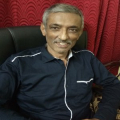You have no items in your cart. Want to get some nice things?
Go shopping
I was in a freewheeling holiday mood when the train I was in touched a station that bore the intriguing name of Hwakthu. I disembarked and, after checking in at a hotel, washed up and stepped out for a walk. I was strolling down a footpath when I noticed a balding man walking ahead of me spit, and then, as if on cue, a man with a hooked nose who was crossing the road to my side of the footpath did the same – and that too right in the middle of the road. I was about to explain it away as pure coincidence when a suspicious sound behind me caught my attention. Turning around, I spotted a third spitter, who wore yellow trousers and was may be some ten metres away, spitting with focused intent. At once terms like “chain reaction” and “the domino effect” sprang to my mind and, resolving to get to the bottom of the matter, I quickened my pace and caught up with Spitter Number One, whom I discovered working his mouth in the strangest manner possible. Alarmed as to what this might signify, and wondering what his next step might be, I wasted no time in addressing him while, at the same time, taking care to keep a discreet distance from his person:
“Excuse me,” I began, wearing a smile I tried my best to make amiable rather than condescending, “I’m a newcomer here. I notice the people around here are very fond of spitting. What might the reason be?”
He stopped working his mouth for a moment and looked at me as if he had first thought that I had spoken, but had subsequently changed his mind. Then his mouth resumed its former motions and he kept walking as if I didn’t even exist. A little further down the way he jerked his head and let out a jet of spittle that landed bang on the drain at the footpath’s edge. Horrified as I was, I couldn’t but appreciate his dexterity. I hung on for Spitter Number Two – the road-crosser, who had almost caught up with me. When he finally did, I put on my most disarming smile and greeted him with a friendly “Hi!”
He threw me a questioning look.
“I’m new to these parts,” I began. “It would be nice to know … why do people here so love to spit? I mean, don’t they know of the possible consequences – of how unhygienic it is and all the diseases it might cause?”
I am of an introspective turn of mind, and when I think of it now, it is not impossible that my lips curled subtly in subconscious disdain when I asked this question. You see, I belong to the Big City, the Great City, the place where things happen, where culture is born and bred, and I have an instinctive aversion to the unmannerly and the crude.
Like his predecessor, this fellow chose not to answer. Darting me a look of utter disbelief, he side-stepped away, spat assertively, and began crossing the road again, as if he had decided to keep a safe distance from me.
It was demoralizing, to say the least. The only hope left for me now was Yellow Trousers (though by now I could spy a few other pedestrians here and there getting into the act), but no sooner was he very nearly where I was when he kind of stiffened (did he sniff what I was about?), hailed what I later learnt they called here a “cycle cab” – a cycle lugging a board on wheels on which passengers take their seats – and, determinedly plonking himself on it, made his getaway.
All this was very disconcerting. I needed time to put myself together, so I made my way to a roadside eatery, ordered Pepsi, and spent some ten minutes taking slow, meditative sips while listening to the occasional spitting of the shopkeeper on the other side of the counter. I had taken a chance in getting off at Hwakthu, and it seemed Luck hadn’t quite favoured me on this occasion.
Having had my Pepsi, I continued walking, sometimes stopping to look at things – insects, a park, beautiful spitting women who sacrificed their beauty just to enjoy the supposed pleasures of spitting, and what have you. I tried to observe if the insects there, too, were wont to spit, but though I sat on my haunches and bent low to take a close look at a pair of cockroaches, it was difficult for me to figure out if they were actually spitting or blowing each other kisses. Hardly had I gone another hundred metres than I spotted a group of five men moving urgently in my direction, spitting at random in a variety of styles – sideways, forward, with head bent, with head straightened, while remaining stationary, and on the move. Clearly, spitting in Hwakthu had an extra dimension to it — people there seemed to pursue it as a form of art. However, it was with some trepidation that I noticed that Spitters Number One, Two, and Yellow Trousers were all there, with two new faces to boot.
“Hey you!” called out one of the group I had not seen before (and whom I will refer to as New Face One), when they were quite near me. He was untidy-looking and, God knows why, reminded me of a smashed egg that had splattered all over the floor.
“Hey you!” repeated New Face Two, who was big-built and had ‘Ruffian’ stamped all over him – on his snarl, on his unkempt, unshaven mustachioed face, on the roughness of his voice. He jabbed his thumb in the direction of Spitters Number One, Two, and Yellow Trousers. “So you were asking them a question, right? Come, let’s have that question again.”
“That’s a million buck question,” I retorted. “Do you have the money?”
“Repeat the question,” he threatened.
“I’ll repeat no question,” I countered, “but this much I’ll say: spitting on the streets is a public health menace — it’s the stupidest habit on earth.”
New Face Two rolled up his sleeves and, with the war cry of “Watch your tongue, you nincompoop!” he pushed hard against my shoulders, making me reel. The others too lunged and swung out at me. As I fell to the ground, they swooped down on me like vultures on a fresh corpse.
“Give it to him real good – break the bastard’s limbs!” said one of my attackers.
“Why do they let these bloody outsiders in?” joined in another.
There were loud spits and kicks and curses coming from all over. I bunched myself up and tried to use my hands as shields. Once in a while I shouted out things like, “Let’s talk it over in a civilized way” and, somewhat later, “Don’t think I won’t report this to the police,” but such outbursts were only met by louder curses and louder kicks and louder threats and louder spitting, so, as a final resort, I took to silent prayer. I have never been a particularly devout person, but there are times I do give prayers their due.
When that part of the ordeal ended I don’t know. I opened my eyes to an elderly kindly-looking bespectacled gentleman smiling and nodding at me in an imbecile kind of way. I was comfortably tucked up in somebody else’s bed, moderately but skillfully bandaged, feeling like I had come out of a very deep sleep. Surely I had been administered pain-killers, for there was no pronounced consciousness of body-ache in me. It did take me some time, though, to recall what had happened.
“Allow me to introduce myself,” said the gentleman affably, bringing his face close to mine and widening his eyes appreciably. “I’m Professor S. Zuzubee, Head of the Department of Scientific Research at the Nitwit Foundation. I was returning from office in my car when I saw you being assaulted. They let me pick you up because I’m well-known here. Be that as it may, it took me all my powers of persuasion to convince them that that was not the proper way to deal with the situation.”
“Thank you very much indeed,” I responded, oozing with gratitude. It all came back to me – how I had spoken out for the public good and had been assaulted in consequence. I wiped my face with my hand and gave a passing thought to the fact that the professor would not need to spit separately – he spat generously in the very process of speaking.
The man stood back, straightened himself, and suddenly began to declaim in his thin, tremulous voice:
“God spat on the face of the earth, and from His spit was born the waters of the earth, and from the waters there rose every form of life that exists, including His supreme creation, man.”
“Therefore, it is said,” he continued, “Spit, and be thou God-like.”
I goggled, swallowed, and cleared my throat.
“Er.. This is…?”
“Straight from the Hwakthu scriptures. We have a very distinctive culture here, of which we are extremely proud, as indeed we have every cause to be. And for your kind information, we’ve carried out extensive research on spittle in our laboratories. We’ve come to some revolutionary conclusions on its nature and properties that confirm, without a shadow of doubt – though the outside world persists in being skeptical – that the deep-rooted tradition of spitting in Hwakthu, which goes back many generations, has a thoroughly scientific basis.”
I sat up and eyed the door.
“Besides, why do internal injuries of the mouth heal so speedily?” he went on. “It’s because the antiseptic qualities of saliva, according to path-breaking experiments carried out in our laboratories, is 2.8 recurring times more powerful than those of commercial iodine … and yes, you may also have heard how, in umpteen cultures around the world, people spit to stave off the evil eye.”
Well, if I was on pain-killers, I would put them to maximum use. I jumped out of bed, slipped my feet into my shoes like greased lightning, and made a dash for the exit. I heard the professor hurry up to the door after me and shout:
“Did you know Hwakthu is a global manufacturer of spittoons?”
Spittoons? So, that’s what they were – those peculiar ashtray-like objects at various points on the hotel floor that were not quite ashtrays. I’d asked the boy taking me to my room, and he had said, “That’s just to make the place look nice.”
When I eventually reached the police station, I unburdened myself unreservedly to the OC with the qualification – recent events having made me wiser – “I know spitting enjoys a high status in Hwakthu, yet … violence is violence, a crime is a crime, assault is assault, isn’t it?”
The OC was a beady-eyed fellow with a heavy jowl. Despite spitting at intervals of about five minutes into an intricately patterned silver spittoon (which he followed up by taking a gulp of water from a glass in front), he had listened to my tale with riveted attention, but what he now did caught me completely off-guard. He thumped peremptorily on his desk-bell and, when a constable popped in, ordered him to immediately lock me up.
By now the effect of the pain-killers had begun to wear off.
“But … but … but!” I faltered, somewhat at a loss for words.
“There are no ‘ifs’ and ‘buts’ in my vocabulary,” he declared.
I felt around in my mouth to see if I could find my tongue. When I discovered it was there, fully intact, I threw out a quick “Why? What have I done? Why me and not those culprits?” even as the constable ominously closed in on me.
Again the OC thumped on the table.
“Violence is of two kinds – physical and non-physical,” he began. “Non-physical violence can sometimes be of a more serious nature than the physical kind. For instance, attacking a community’s sacred beliefs is a much more serious matter than attacking a person who has attacked your community’s sacred beliefs – you see what I mean? The second kind of attack can even be termed an act of patriotism. Do not our soldiers kill enemy soldiers on the battlefield? You’re an educated man – tell me. Are these soldiers who kill enemy soldiers considered culprits or heroes?—Tell me. Are they or are they not rewarded by the government? Who can say you’re not a part of an international conspiracy to create disorder in Hwakthu? And yet, because our culture is so tolerant and forgiving, the Professor did all in his powers to come to your help. In which other place of the world will you find such largeness of heart? … Constable, lock him up!”
The constable, who had turned to statue at his superior’s oratorical performance, came back to life again and, robot-like, resumed business.
The situation called for divine intervention. I signaled God a SOS. My right arm in the constable’s firm grip, I was being unceremoniously led towards the door when inspiration flooded my mind like equatorial sunlight after a week of polar snow. All my symptoms of physical and psychological agony vanished like birds at the sound of gunshot.
The door before me had swung open perhaps half a foot on its outward path when – I myself don’t know how it came about – I drew my mouth to a perfect little circle and directed a missile of spit through the slender opening, punctuating the act with a swashbuckling swoosh. From the corners of my eyes I watched the OC spring to his feet like a Jack in the box.
“Wait!” he thundered, but it was welcome thunder, thunder in a parched, blistered land waiting for the miracle of rain.
You have got to strike when the iron is hot. I turned and raked my throat so loudly that, torso upward, I vibrated like a turned-on car engine. Having gathered a satisfactory mixture of mucus and spittle in my mouth, I used my tongue to work it into a gelatinous, open-ended globule of sorts the size of a playing marble and released it – swoosh! – like a bullet into a broken, discarded tin dustbin some five feet away that was simply asking for it.
“Bravo!” exclaimed the OC. “Constable, release him!” He beamed at me like he had just won the world’s richest lottery:
“Take a seat, sir… Constable, coffee and samosas…on the trot!”
He turned around and beamed at me so hard his eyes almost disappeared from his face. “Sir, you didn’t once tell me you could do these things – not once!” he protested, wagging his forefinger and then coming around his desk to greet me with extended arms. We embraced like reunited bosom friends.
“Make I make a special request?” he asked.
“Sure.”
“Could you do it again,” he bubbled, “there – into my spittoon?”
Instinctively, I obliged. It was child’s play to me. I became witness to the fact that geniuses are born, not made.
“We could certainly do with people like you here, sir,” the OC gushed. “You could mentor the
younger generation. All the fame and respect you can ask for will be yours… By the way, sir,
where are you working at the moment?”
“There’s an observation I’d very much like to make,” I commented, in a duty-first kind of tone.
“People here don’t rake their throats enough before spitting. It would significantly enhance the
quality of their spit… give it more substance, if you know what I mean.”
“Indeed, sir, indeed,” he responded. He regarded me as if I was the latest wonder of the world.
Everything was very hunky-dory between us after that, very hunky dory indeed. Strange it was,
then, that some part of me wanted to scream and get drunk … or get drunk and scream, if that
would help me scream louder.

Gautam Sen
Gautam Sen is an Indian writer who has written a non-fiction best-seller (in India) called ‘The Mind of Swami Vivekananda ‘(Jaico), a children’s novel, ‘The Fantabulous Fens’ (Central Avenue Publishing, Canada), and a poetry chapbook (Kindle). He has also co-authored two volumes of essays and letters ‘Essays and Letters for Winners’ (Macmillan India). His short story, ‘The Underdogs,’ features in ‘Prizewinning Asian Fiction’ (Hong Kong University Press).





Wonderfully written story. Excites the reader to read it again and again. The characters seem to come alive as you read the story. You could actually feel yourself as the spectator to what was going on.